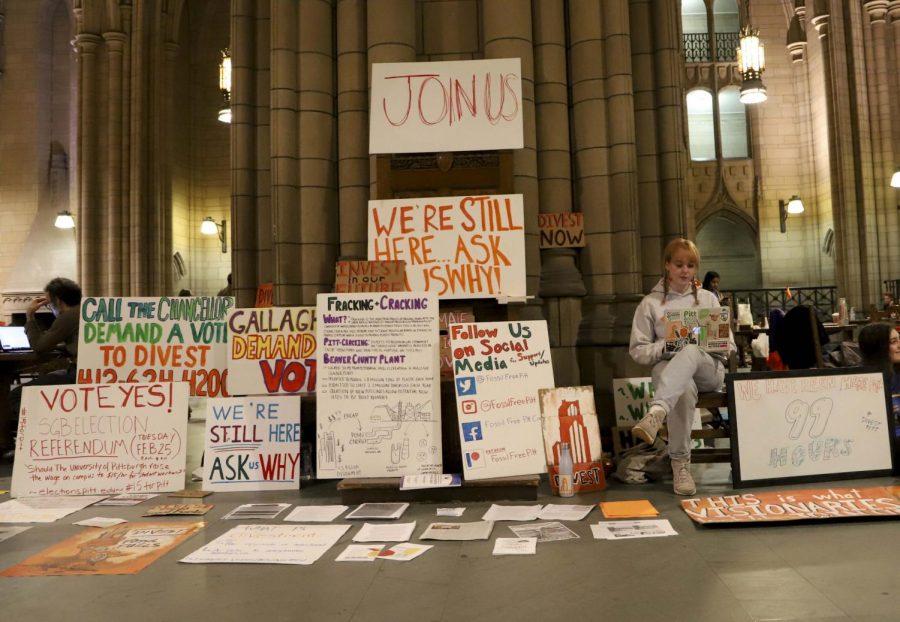Editorial: Pitt, don’t stall on divestment, just vote
Sarah Cutshall | Visual Editor
Fossil Free Pitt Coalition occupied the Cathedral because they wanted a divestment vote at Friday’s Board of Trustees meeting, but instead, the Board voted to establish an SRI process, elongating the process.
March 1, 2020
The Fossil Free Pitt Coalition is occupying the Cathedral of Learning indefinitely as of last Friday. These students only want one thing — divestment.
Their occupation began on Feb. 21 with the intention of pressuring the Board of Trustees to divest Pitt’s $4.3 billion endowment from fossil fuels. All week leading up to the Trustees’ meeting, students ate and slept on the main floor of Cathy, educating those who walked past on their mission by handing out flyers and displaying signs promoting their cause.
FFPC occupied the Cathedral because they wanted a divestment vote at the meeting, but instead, the Board voted to establish a socially responsible investing process. The newly approved SRI process allows Chancellor Patrick Gallagher to advance the students’ divestment request by either bringing it directly to the Board or assembling an ad hoc advisory committee to analyze the drawbacks and benefits of divestment. The findings would then be sent to the board. Gallagher and Board chairperson Eva Tansky Blum must not choose the route of forming an advisory committee, which seems like a waste of time considering the existing amount of evidence that divestment has worked for other universities.
Pitt would not be accomplishing something unheard of by committing to divestment. After the UMass Board carefully evaluated the benefits and drawbacks, the school became the first major public university to commit to divestment back in May 2016. Georgetown University in Washington, D.C., voted to begin divestment in early February of this year, after sustained efforts from its own student-run fossil free coalition and review of divestment actions from a committee. Both universities did so primarily for environmental reasons.
“Animated by our Catholic and Jesuit identity, our University has sought to strengthen opportunities for our community to contribute to a more sustainable future by fostering dialogue, research, education and the engagement of all members of our community,” Georgetown President John J. DeGioia said. “This decision by our board of directors advances the deep commitment we have to sustainability and our efforts to respond to urgent global environmental challenges.”
The University of California school systems also voted to divest in September 2019, but the university said that, unlike UMass, its decision was not based on the moral high ground of climate change. Jagdeep Singh Bachher, UC’s chief investment officer, and Richard Sherman, chair of the UC Board of Regents’ Investments Committee, said that they feel “hanging on to fossil fuel assets is a financial risk.”
“The reason we sold some $150 million in fossil fuel assets from our endowment was the reason we sell other assets: They posed a long-term risk to generating strong returns for UC’s diversified portfolios,” Singh Bachher and Sherman wrote.
All of the above — climate risk and financial risk — are things that an ad hoc committee at Pitt would evaluate. But these are also all things that have already been evaluated by other college campuses, who have gone onto divest after analyzing their findings. FFPC organizer Prem Rajgopal said that creating an ad hoc committee to study a particular investment exclusion a “stalling tactic” and that the committee would not uncover any new information.
Pitt needs to stop dragging its feet and just vote on the issue. We already know what a committee will find, and until the Board votes, no changes — environmental or fiscal — will be implemented.








